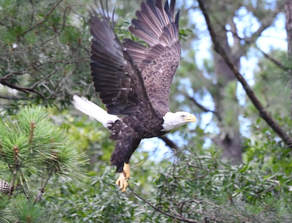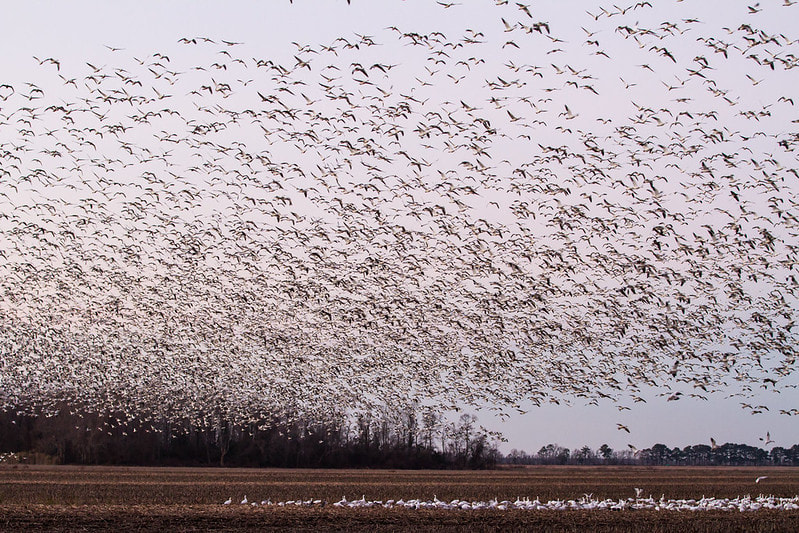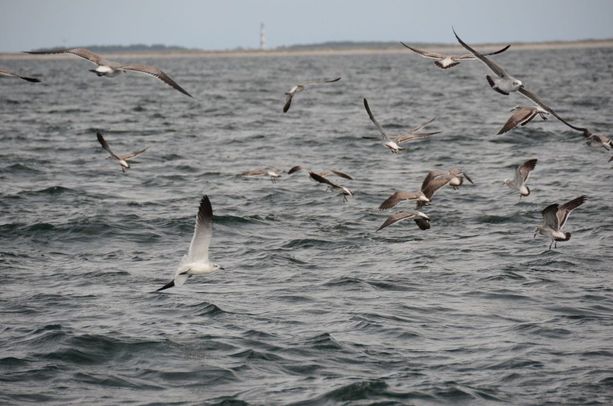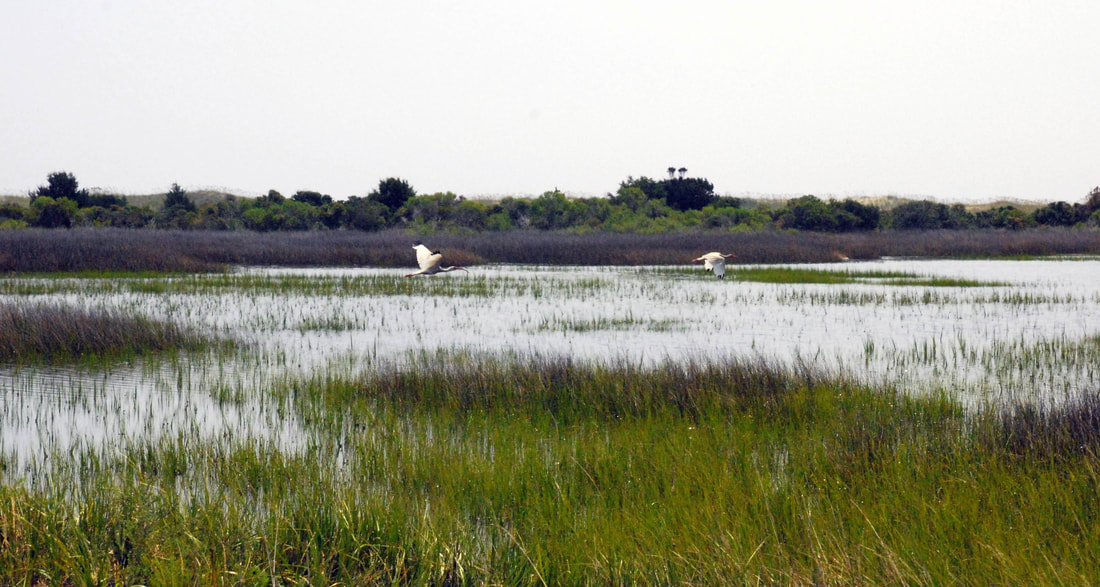|
READ the following statement for Southern Conservation Partners authored by board chair Milo Pyne. . . .
In addition, we recommend this Aug. 20, 2020 INTERVIEW with J. Drew Lanham (Clemson University wildlife ecology professor; author of numerous profound essays concerning environmental justice and issues for minority populations in America; and author of books including The Home Place: Memoirs of a Colored Man's Love Affair With Nature and 9 Rules for the Black Birdwatcher. The interview was conducted by Tom Fleischner, Natural History Institute executive director and chair of the Ecological Society of America's natural history section. ___________ "Friday, June 19th, was Juneteenth, an annual celebration commemorating the end of slavery in the United States. To honor this solemn anniversary and to demand continued work toward true liberation for black people in this country, hundreds of thousands of people took to the streets in a national day of action organized by Black-led groups on the front lines of this fight. We will continue to remember ... George Floyd Breonna Taylor Ahmaud Arbery Rem'mie Fells Sandra Bland Rekia Boyd Trayvon Martin Riah Milton Tony McDade Rayshard Brooks Oluwatoyin Salau … and countless other Black lives lost to police brutality and racist violence. We at Southern Conservation Partners must sadly acknowledge that the conservation lands forming the backbone of land and biodiversity conservation in the southeastern United States were first stolen from the indigenous inhabitants—members of civilizations and groups we now call the Cherokee, Lumbee, Shawnee, Choctaw, Natchez, Yuchi, Eno, Caddo, Timucua, Catawba, Seminole, and many more. Their names live on in the terms by which we describe many of our rivers, National Forests, and other conservation lands. (continued...)
2 Comments
 Photo by Tom Earnhardt Photo by Tom Earnhardt Nick Haddad, previously a professor of ecology at NC State University and presently senior ecologist with the W.K Kellogg Biological Station in Michigan, recently authored a fascinating and thought-provoking book, The Last Butterflies: A Scientist’s Quest to Save a Rare and Vanishing Creature (Princeton University Press, 2019). His quest involved determining which of half-a-dozen butterfly species is most at risk of extinction—regrettably, most of them barely clinging to survival in southern U.S. habitats. <<continued....>> This year, with clear evidence that the Trump Administration is jeopardizing many U.S. environmental conservation and protection programs and policies, with hugely damaging consequences, Gary E. Machlis, former National Park Service science advisor (and Clemson University professor of environmental sustainability), and Jonathan B. Jarvis, retired NPS career professional and national director from 2009 to 2017, co-authored an important and inspirational book. The Future of Conservation in America: a Chart for Rough Water (University of Chicago Press) asserts that we are in a period of “rough water,” affecting many environmental assets and conservation programs. The authors identify three major environmental and social threats (and the dangerous irresponsibility of denying them) confronting America: climate change, species extinction, and economic inequality. Actions are required to navigate through the very rough waters facing us. It is essential to assure that the conservation movement is understood by Americans (and especially by young people) as critically relevant to public health and interest. A general re-commitment to environmental conservation and protection is necessary. <<continued>>
With ecological systems being altered and assaulted at unprecedented scale and rate, it is time to increase our focus on ecological restoration and renewal. Our fragile ecological systems in the southern U.S. and across the entire Earth are damaged and imperiled. Preservation and conservation are not enough; we need to work more intensively to restore abused ecological systems and natural habitats.
In an essay by conservation biologist and Aldo Leopold biographer Curt Meine, re-published in the summer 2018 issue of The Leopold Outlook, the author reminds us that the relationship between humans and the world is reciprocal. “As we work to heal the Earth, the Earth heals us.” Meine recalls that Aldo Leopold, the father of wildlife conservation in America and pioneering figure in ecological restoration in the 1930s and 40s, noted that “Conservation, viewed in its entirety, is the slow and laborious unfolding of a new relationship between people and land.” Meine observes, “Conservation has evolved continually over the last century in response to the complex realities of social and environmental change. . . . Now, however, conservation finds itself caught in an intense and persistent vortex. Much of the debate involves our understanding of ecosystem change, the human role in affecting those changes, and the perils and potential of new technologies to respond to change.” <<Continued>>  Photo by Tom Earnhardt Photo by Tom Earnhardt --by Chuck Roe Private land trusts are on the front lines in defending and advocating for the protection of the most extraordinary natural areas and ecological treasures in the southern U.S. Beyond landowners, no one is more important than private land trusts and conservancies in safeguarding our natural heritage. I compose this essay in reaction to reading the recently adopted Land Trust Alliance (LTA) Strategic Plan for 2018-22. That plan and its proposed action steps are meritorious, ambitious, and logical in progressive evolution from the national association’s previous strategic plan. But I see a glaring omission in the LTA Plan’s introductory statement of purpose for the land trusts of America . . . >Read more HERE. Against a backdrop of mutual challenges in the Albemarle-Pamlico estuary from climate change and budget shortfalls, an updated partnership between Virginia and North Carolina is starting to flex its collaborative muscle with important border-blind issues: wetlands, algal blooms, and fish travel. A memorandum of understanding signed late last year paves the way. This article by Catherine Kozak from the Coastal Review Online tells the story . . . READ HERE.
|
When we see land as a community to which we belong, we may begin to use it with love and respect.... Conservation, viewed in its entirety, is the slow and laborious unfolding of a new relationship between people and land." There is in fact no distinction between the fate of the land and the fate of the people. When one is abused, the other suffers. From the PresidentSCP President Chuck Roe looked at land conservation along the route of John Muir's "Southern Trek." About ViewpointThis blog offers views of our Board and partners. We invite your viewpoint on the following questions: Archives
September 2023
Categories
All
|




 RSS Feed
RSS Feed